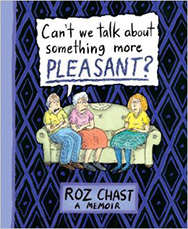Books |
Can’t We Talk about Something More Pleasant?
Roz Chast
By
Published: May 28, 2014
Category:
Memoir
“What sort of person calls after midnight?”
New Yorker cartoonist Roz Chast asks herself that question twice in her memoir.
The answer is obvious.
Your aged parent.
Or, worse, the hospital.
I’ve resisted “Can’t We Talk about Something More Pleasant?” for weeks, and for very predictable reasons. My father, like Chast’s parents, was born in 1912. (My father died in 1998, the same day as Frank Sinatra, who got all the media attention.) My mother, born in 1917, is now 97. (She’s lost a step, but she’s still The Matriarch. Her mother lived to 103.) When the phone rings after 9 PM, I freeze. Going to that place in fiction is one thing, in non-fiction quite another. Some things can wait.
Chast’s parents were Brooklyn Jews. They met in the 5th grade, got married without really dating, did everything together. Elizabeth was a tough-as-a-boot school administrator. (Beware “the Chast blast.”) George was a teacher. Roz was their only child.
In 1990, when she was pregnant with her second child, Roz moved to Connecticut. Marriage, parenting, career — an entire decade slipped away without a visit to Brooklyn. That’s right: Her parents are closing in on 90, and Roz hasn’t visited them in a decade. And then… well, here’s the story in brief.
The fool in me believes that New York Jews will weep the best tears and have the biggest laughs at this cosmically absurd story of oldsters “slowly leaving the sphere of TV commercial old age” — (“SPRY! TOTALLY INDEPENDENT! JUST LIKE A NORMAL ADULT, BUT WITH SILVER HAIR!!!”) — and moving into “the part of old age that was scarier and harder to talk about.”
The smarter me knows better. The reason “Can’t We Talk about Something More Pleasant?” raced to #1 on the New York Times list of graphic books is that it tells a universal story. Roz Chast deals, tenderly and brutally, with the thing that no one talks about — the skull on the banquet table and how, no matter how hard we try to avoid it, life forces us to deal with it. [To buy the book from Amazon, click here. For the Kindle edition, click here.]
Here’s the story of a long marriage. A not nearly happy childhood. The belated visit to the parents’ home and the discovery of “Grime.” The mother’s falls. The father’s talking, talking, and his obsession with bank books. The Elder Lawyer, who actually gets the parents to Make a Plan. (Will they move their money to their child so the government will pay for their possibly ruinous end-of-life expenses? No way.) Mom buying bargains because… well, they’re bargains. The refusal to see doctors. The move to Assisted Living (aka “The Place”). The nursing home. The money flowing out, and the unworthy thoughts about it: “Oh my God, $14,000 a month. I could have had that money.” The father’s death, the mother alone. The nice nurse from Jamaica (the island, not Queens). The daughter’s final attempt to get close to her mother. And The End.
Astonishing how much you laugh along the way. Even more astonishing: how Roz Chast deals with every bit of it. Not just spending time and making arrangements, but dealing with the emotions that come up along the way. She realizes that her father “was not a very strong person” and, at the same time, “All I felt for him was how much I loved him, and how much he loved me.” Her mother? “She loved me, but we never got along — maybe it was a chemical thing, but we could never understand each other.”
The very end? Roz Chast watches her mother in her hospice bed and, reflexively, she does what she can: She draws. To say those drawings are magnificent is to understate.
And then there’s a touching, funny, completely Chastian epilogue.
But you knew there would be.


